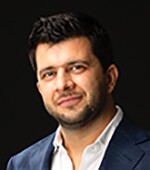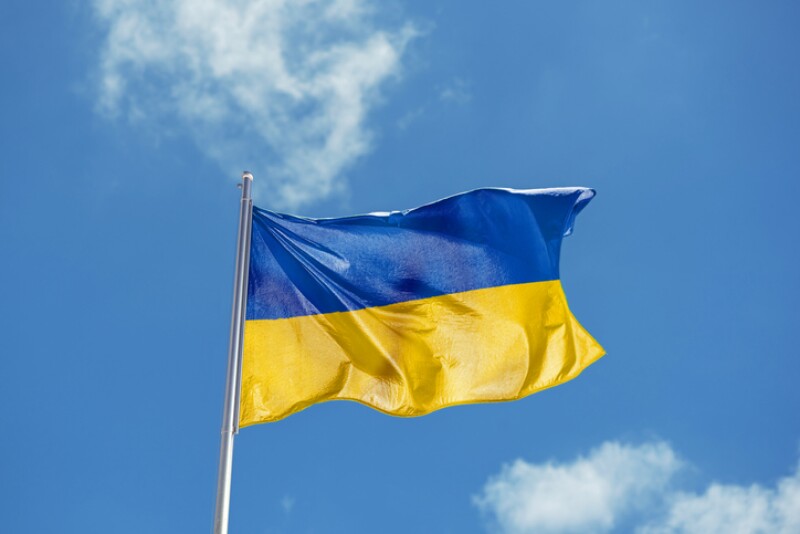Why?—No, How?

In September, I embarked on a particularly meaningful journey—a visit to Ukraine. What set this visit apart was, of course, the context: a country in the European region actively at war. Naturally, this raised a recurring question from nearly everyone I spoke to: Why Ukraine? It was a question I heard from colleagues, SPE staff, and even from Ukrainian section officers themselves.
For me, however, the decision felt instinctive. Ukraine is one of the highest-performing and fastest-growing sections in Europe, a feat that would be impressive under normal circumstances. But achieving this level of excellence amidst the challenges of war demands even greater recognition. It was only fitting that their remarkable operational success should be acknowledged by the Regional Director.
So, to me, the question was never why visit, but rather how to ensure the trip would be both feasible and impactful. I must extend my sincere thanks to Yurii Moroz, the section chair, and Steve Byrne from SPE, whose careful coordination with insurers and diligent preparations made this visit possible. Their efforts ensured that this journey was not only successful but also safe.

Prequel
My week in Ukraine actually began with an unexpected prelude at the Paralympic Games in Paris. I had taken my children to watch the Para Athletics competition, and that evening something remarkable happened: Ukraine won three gold medals. Intrigued, a quick search revealed that Ukraine consistently ranks among the top nations in the Paralympic Games medal table. In fact, when measured against population size, Ukraine often ranks no. 1 in medals per capita in Paralympic competitions.
There are various reasons for these out-of-the-ordinary figures. However, the most important takeaway is that this achievement speaks to Ukraine’s deep-rooted resilience and courage in the aftermath of Chernobyl and after the impact of multiple conflicts.
This theme of unparalleled perseverance would later become a focal point in my conversations with the rector of Yuri Kondratyuk Poltava Polytechnic National University—but more on that later.
Crossing the Border
My journey to Ukraine was a long one. Departing from Krakow, Poland, at 9:20 a.m. by bus, I arrived at my first destination in western Ukraine at 7:40 p.m., after 10 hours of travel. What struck me immediately was that the bus was filled entirely with women. I had known this was the case, but seeing it firsthand made a much deeper impact. It was a powerful reminder that I was entering a country at war.
This was the first of many signs that things were far from normal. Much like during World War II, women have become the backbone of the economy, holding their communities together while much of the male population is engaged in the conflict. Their resilience and strength were palpable from the very start of my journey.
Ivano-Frankivsk: The Legacy

The first stop on my tour was the city of Ivano-Frankivsk, located in the southwest of Ukraine within the picturesque Carpathian Mountains. This region, known as the Outer Carpathians, is one of Central Europe's largest petroleum provinces and among the world’s oldest oil-producing areas. Historical records of oil seeps near the town of Boryslav date back to the 1770s, with the first commercial well becoming operational in 1861—one of the earliest in the world. Ivano-Frankivsk National Technical University of Oil and Gas is part of this rich legacy, as highlighted by Professor Igor Chudyk, the rector of the university.
I had the honor of participating in the inauguration ceremony for the incoming class of petroleum engineering students. Around a hundred students gathered, and beyond my own speech as Regional Director, the ceremony included a unique tradition—shaking hands with oil. This symbolic gesture represents the students' initiation into the field, connecting them with the history and future of the industry.

As someone who often reviews membership figures in Europe through Excel spreadsheets, witnessing firsthand the high rise in student enrollment in Ukraine was truly eye-opening.
Despite the challenges the country faces, hundreds of students continue to flow into the petroleum engineering faculties each year. Whether motivated by a desire to help develop their country or by the prospect of a future international career, their dedication is impressive.
Another memorable moment during my visit was recognizing the donation made by the SPE Central Ukraine Section to the university, aimed at providing essential teaching equipment and aiding in the reconstruction of damaged facilities. In June, a missile strike hit the main auditorium of the university, destroying two buildings. The blast shattered all the windows of the university and nearby residential buildings.
I had the opportunity to witness the delivery of the new equipment firsthand and was deeply moved by the gratitude expressed by the university’s rector. He praised SPE as a whole for its unwavering commitment to putting people first, and for going above and beyond to support its members, including students, during such challenging times. “The support shown through the Regional Director’s presence at the class inauguration and the section’s donation was a powerful testament to SPE’s core values in action," he said.

Poltava: The Rising Star
That same night, I boarded one of the famous Ukrainian night trains to cross the country eastward to Poltava. After a quiet stopover around 11 p.m. at the Lviv train station—a magnificent testament to art nouveau architecture—the tension began to build up along the voyage. As dawn approached, we began to see air defense stations along the line towards the frontline. Poltava is indeed the last significant stop before Kharkiv and the central northern front.
Upon arrival, I was immediately greeted by the wail of an air raid alert. My local contact, Maksym Dorokhov, met me with a hearty handshake and a wry smile. "Welcome to Poltava," he said, his Cossack sense of humor shining through the tension. His lightheartedness in such circumstances was both startling and comforting—a testament to the spirit of the people here.

The reality of the conflict was ever-present. We had to hold meetings in shelters and adapt our schedules around the frequent air raid alerts. That night, I slept in a basement shelter, enduring seven air raid alerts and even a kamikaze drone raid. The sounds of conflict pierced the silence, but the resilience of those around me offered a profound sense of security amidst uncertainty.
Despite these challenges, Poltava was a necessary and enlightening stop. The city hosts the Yuri Kondratyuk Poltava Polytechnic National University, one of the most dynamically growing institutions in Ukraine.
The university leverages strong partnerships with private companies to enhance its educational offerings and research capabilities. Collaborations with industry leaders like DTEK—Ukraine's first private operator—and service companies such as Weatherford have been instrumental. These partnerships not only provide students with practical experience but also contribute to the region's economic resilience amid challenging times.
Poltava itself is a hub of economic activity. The energy sector here is vibrant, with numerous projects focused on both traditional and renewable resources. The synergy between the university and the industry creates a fertile ground for innovation and development. During my visit, I was particularly impressed by the students' eagerness to learn and their commitment to contributing to Ukraine's energy future.

Conversations with faculty members and students often took place in underground shelters, yet the discussions were no less impactful. We focused on the importance of technology transfer, sustainability, and preparing the next generation of engineers to tackle global challenges. The spirit of determination was evident everywhere, echoing the resilience I had witnessed since the beginning of my journey.
One poignant moment was when a student asked me, "How can we make a difference when faced with such adversity?" My answer was simple: "By continuing to learn, to innovate, and to support one another. Your perseverance is the foundation upon which the future is built."
Kyiv: The Heartbeat of a Nation

My final destination was Kyiv, the capital city—a place where history and modernity intertwine against a backdrop of resilience. Here, I had the opportunity to meet with C-level executives of leading energy companies. They shared a clear vision of their technical challenges and how SPE can support the reconstruction and modernization of Ukraine's energy infrastructure.
The discussions were forward-looking, focusing on innovation, sustainability, and international collaboration. It was inspiring to see how, even in the face of adversity, there is a steadfast commitment to progress and excellence.
At night, the reality of the ongoing conflict was impossible to ignore. The incessant noise of the Patriot anti-missile system served as a somber reminder of the challenges faced daily by the people of Kyiv. Yet, life goes on. The city's vibrant streets, bustling cafes, and cultural landmarks stand as testaments to the indomitable spirit of its inhabitants.

A highlight of my visit was the inauguration of the new SPE student chapter at Taras Shevchenko National University of Kyiv, one of the country's most prestigious institutions. This event marked the next big step in SPE’s growth strategy in Ukraine. The enthusiasm of the students was infectious. They are eager to engage with the global SPE community, contribute to technological advancements, and play a role in shaping the future of the energy industry.
The inauguration ceremony was a blend of tradition and innovation, reflecting the university's rich history and its commitment to leading in academic excellence. The students' passion for learning and their determination to make a positive impact were truly inspirational.
Reflection
As I reflect on my yellow-and-blue week, I am filled with admiration for the resilience, courage, and unwavering optimism of the Ukrainian people. From the determined women who keep the wheels of society turning, to the students and professionals who strive for excellence despite the odds, Ukraine embodies a spirit that is both humbling and motivating.

My journey was more than a professional visit; it was a profound personal experience that reinforced the importance of solidarity, collaboration, and the human capacity to overcome adversity. SPE's mission to connect and support professionals around the world has never felt more significant.
In Ukraine, I witnessed firsthand how challenges can ignite a collective determination to build a better future. It is a reminder that even in the most difficult times, there is always room for hope, innovation, and progress.
As we continue to work together, I am confident that the bonds forged and the initiatives started during this trip will lead to lasting positive impacts—not just for the SPE community, but for the broader energy sector and beyond.
"Resilience is not about overcoming, but becoming." — Sherri Mandell


